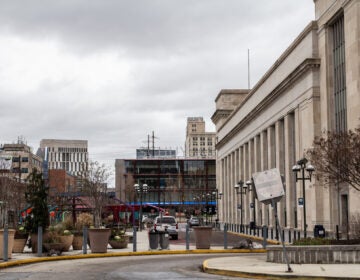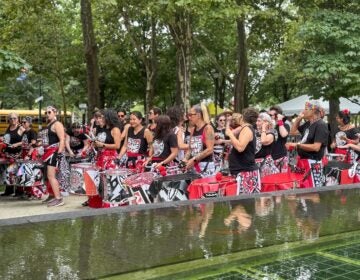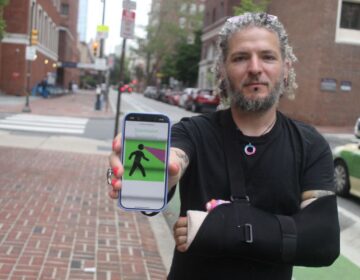Manayunk state store customers side with Corbett on privatization
Many residents in Manayunk have taken a similar position as Gov. Tom Corbett in support of state liquor store privatization in Pennsylvania.
A study recently released by Gov. Corbett says the state could make up to $1.6 billion from the sale of wholesale and retail licenses.
Customers NewsWorks recently spoke with at Main Street’s Wine & Spirits store were all in favor of privatization, something they feel will bring lower prices and rid the state of a system they deem outdated.
“I feel like it’s super wasteful,” Tiffany Moore, 33, of Manayunk said of state-owned liquor stores. “The private liquor stores in California create lots of jobs. [Pennsylvania] buys all this alcohol in bulk and none of the discounts are readily passed on to customers. I think it’s an antiquated system.”
Steve Maher, 44, said privatization would lead to reduced prices. “And there would be more variety,” he added.
Wendell Young IV, president of the United Food and Commercial Workers, Local 1776, disagrees.
“These wholesalers are going to apply their own markup,” he said. “That markup in the rest of the nation is about double than it is in Pa. It will lead to higher prices.”
Concerning a greater variety, Young IV said private stores would only sell a “couple dozen to a couple hundred items. They won’t carry the inventory that Pa. carries.”
Other Manayunk residents, such as Steve, 28, who declined to give his last name, favors privatization despite beliefs that the estimated $1.6 billion windfall may not prove as beneficial as House GOP leaders have asserted.
“I don’t think the number would be that high. I don’t think they’d be able to sell all their assets. I think it could fill some holes, but you can’t have a billion dollars every year. It’s a one-time shot,” he said. “Pennsylvania’s behind the times in how they handle liquor and liquor commerce,” Steve added, pausing to acknowledge the 5,000 job losses that would be a negative aspect of privatization. “You’d gain jobs, too, with privatization.”
“That would depend on if the new private liquor stores want to hire them,” Michelle Hedberg, 24, said. “What are the chances of that happening?”
According to Young IV, private wholesalers mostly hire part time, minimum wage employees. “They’ll continue to employ the people they already employ,” he said. State owned liquor store employees “make better wages, significantly better.”
Jersey native, Frank Casella, 30, who now lives in Manayunk, prefers his home state’s “more convenient,” cheaper prices and normal hours. “I really don’t think a state needs to run a liquor store. What I just bought, Dewar’s, is $15 cheaper in Jersey,” he said.
Young IV says the last three newspapers that have done studies have concluded that “in most cases Pennsylvania had products priced lower. There is one state that is unique. That is Delaware,” Young IV said. “Delaware doesn’t have any retail taxes. So it is true that a lot of people cross the border to buy alcohol. People flock into Delaware in huge numbers because there’s no sales tax.”
Young IV added that Pennsylvanians don’t have to travel far to get low quality “nuisance liquor stores.”
“That’s what you get when you get privatization. Don’t we already have a problem with nuisance bars in the private sector?” Young said.
In a Franklin & Marshall College poll released Thursday, survey results show only 17-percent of Pennsylvanians feel selling state liquor stores to private companies is an important issue. Fifty-four percent of Pennsylvanians feel passing a comprehensive transportation plan to fix the state’s roads and bridges is the most important issue. Forty-three percent think the state should prioritize passing a tax on natural gax extraction and distribution. The poll represents responses from 525 adult residents in Pennsylvania.
The PLCB’s net profit margin is 6.6-percent, according to Young. Walmart has a net profit margin of 3.89-percent, Supervalue –3.96-percent, Target 4.33-percent, and Wholefoods 2.98-percent.
“The bottom line is this: it’s way above these private retailers,” Young said. “The PLCB has no debt. It pays 100-percent of its bills and still clears a higher net profit. The PLCB is hugely profitable for taxpayers of Pennsylvania.”
In a recent statement, Corbett said he would sign a feasible proposal for privatizing the liquor stores. He said he’s still figuring out how the state would spend revenue made from the sale of state stores.
WHYY is your source for fact-based, in-depth journalism and information. As a nonprofit organization, we rely on financial support from readers like you. Please give today.




